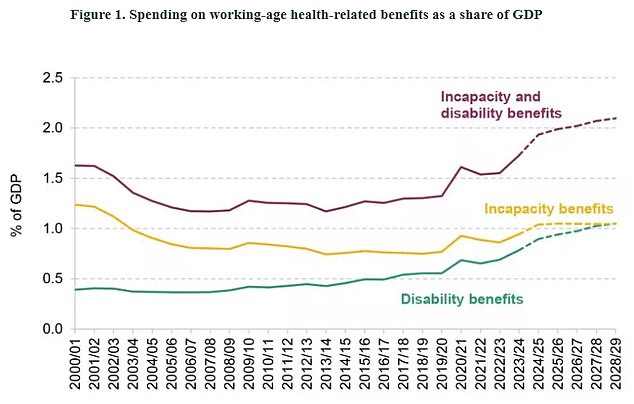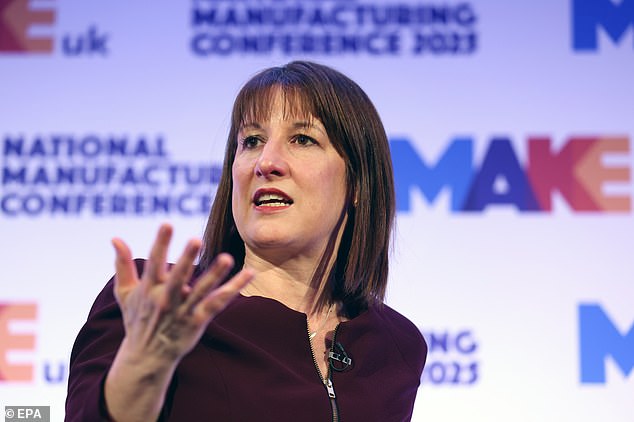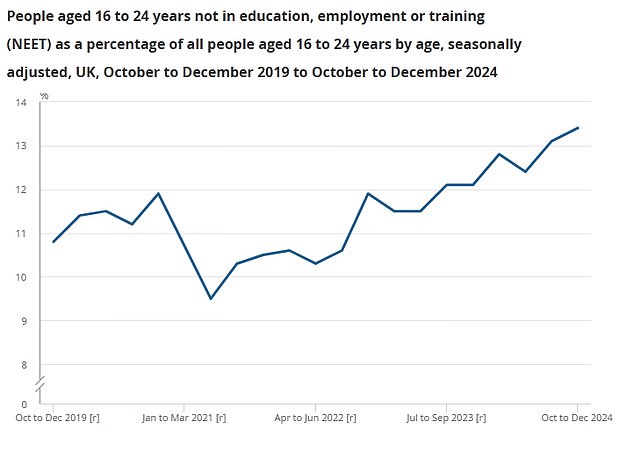Keir Starmer is facing a revolt over plans to axe £5billion from the welfare as the government scrambles to balance the books.
Labour MPs have been warning of ‘deep concern’ over ‘draconian’ curbs with details expected to be announced as soon as tomorrow.
Liz Kendall is set to declare that workers who lose their jobs should get more than long-term claimants. Check-ups on those who are getting sickness payments are also due to be bolstered.
The bulk of the savings are likely to come from making it harder to get personal independence payments, while disability handouts could be frozen in cash terms.
Ministers have been making the ‘moral’ case for reforming welfare, with Rachel Reeves pointing to the near-million young people not in education, employment or training.
The Chancellor is battling to avoid the need for more tax rises at the Spring Statement later this month, after stalling economic growth and rising debt cost wreaked havoc with her Budget plans.
She is also under massive pressure to ramp up defence spending amid rising alarm at the US withdrawing support from Europe and doing deals with Russia.

Liz Kendall is set to declare that workers who lose their jobs should get more than long-term claimants

The benefits bill has been rising and is forecast to continue going up
Health and disability benefits in sicknote Britain are expected to cost more than £100billion a year by the end of the decade – which would be more than the defence budget even after Keir Starmer’s recent boost.
The Office for Budget Responsibility (OBR) estimated in October that the cost of long-term sickness handouts will rise from £64.7billion in the 2023-24 financial year to £100.7billion in 2029-30.
That would be around 3 per cent of GDP, while Labour has committed to spending 2.5 per cent by 2027 and looking towards 3 per cent after the next election.
Currently 9.4million Britons are neither in a job or looking for one, equating to more than a fifth of the working-age population. It includes a near-record figure for those signed off with long-term sickness.
The 2029-20 figure of £100.7bn equates to 3 per cent of GDP,
Speaking to the BBC’s Westminster Hour on Sunday, Labour MP Rachel Maskell said colleagues were ‘deeply concerned’ about the prospect of changes to the system.
She told the programme: ‘We recognise the economic circumstances that we’re in and the hand that we were given and of course it is right that the Chancellor has oversight over all those budgets but not at the expense of pushing disabled people into poverty.’
She added: ‘There’s got to be a carrot approach not a stick approach.
‘We’ve got to make the right interventions and that doesn’t start with the stick.’
Ms Maskell said that she had ‘picked up […] deep deep concern’ from colleagues and called for a ‘compassionate system and not taking just draconian cuts’.
There are claims that up to 80 MPs are ready to oppose the reforms.
The government wants to create a new, time-limited benefit for those who find themselves out of work after paying into the system, dubbed ‘unemployment insurance’.
It will have a lower age limit – likely around 22 years – with different support set to be announced for out-of-work youngsters.
The aim is for those who have not paid into the system to get less out of it than those who have.
However, exemptions will be in place for those who are unable to work because of severe disabilities.
Work and Pensions Secretary Liz Kendall is set to announce the changes to the Commons this week, with a statement expected as early as Tuesday.
She is seeking to save around £5billion from the welfare bill, with the bulk of the cuts expected to come from changes to Personal Independence Payments (PIP).
Cabinet Office Minister Pat McFadden said yesterday that without action four million people would be on long-term sickness benefits.
‘There are 2.8 million people on long term sickness benefits,’ he told the BBC’s Sunday With Laura Kuenssberg.
‘We are an outlier in the UK and not in a good way. We’re the only G7 country that hasn’t recovered its pre-pandemic rate of employment and we’re the Labour Party.
‘We believe in work. We believe in the good that a good job can do for people. We don’t believe it is good that if somebody could work with a bit of support that they’re left to live a life on benefits.

Ministers have been making the ‘moral’ case for reforming welfare, with Rachel Reeves pointing to the near-million young people not in education, employment or training

Figures for the end of last year showed the number of NEETs approaching a million
‘200,000 of those 2.8million have told us they would work tomorrow with the right support. So, we’ve got to reform the system, because if we don’t, the trajectory of standing back and doing nothing is that it won’t be 2.8 million in a few years, it will be over 4 million people. We can’t allow that to happen.’
A government source said: ‘The challenge we inherited and the case for change is stark.
‘When this Government took office last July, more than 9.3 million working aged people were out of work and not looking for employment – that’s more than the entire population of London. 2.8 million of those were out of work due to long term sickness – the highest in the G7.’







